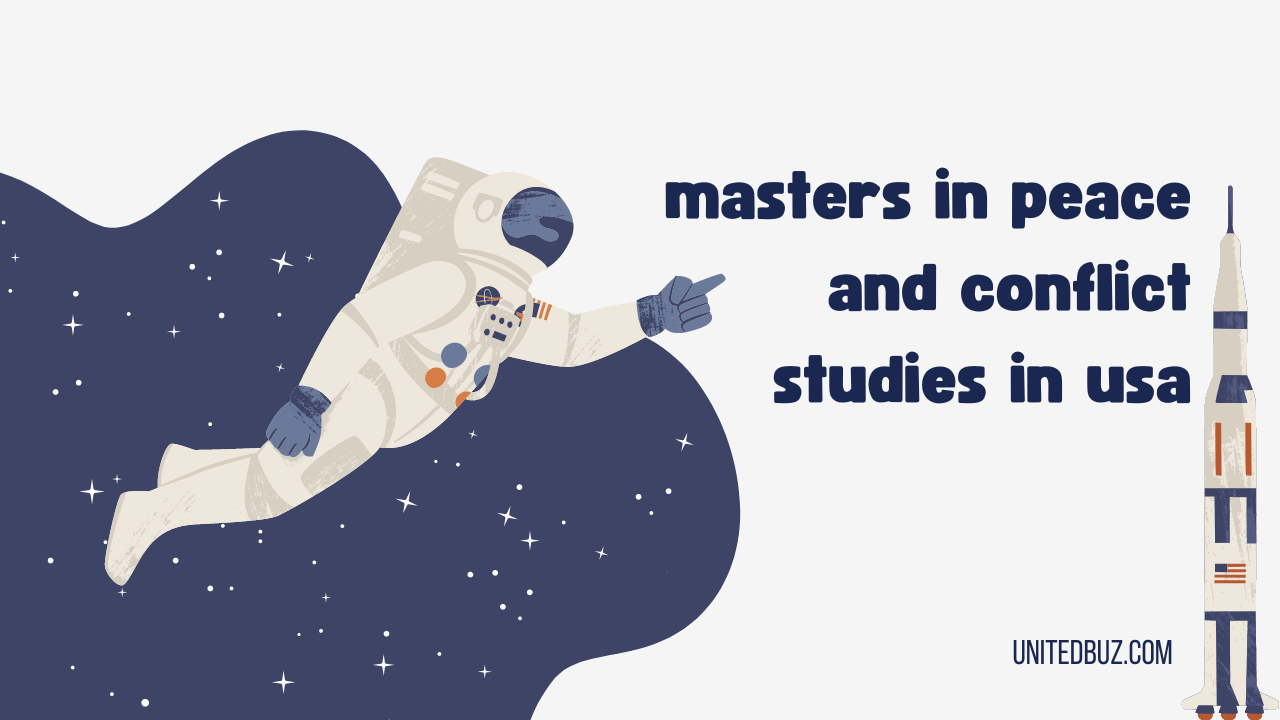Masters in Peace and Conflict Studies in USA: Agents of Change

Introduction
The pursuit of peace and conflict resolution is a noble endeavor that requires deep understanding, empathy, and strategic thinking. A Masters degree in Peace and Conflict Studies in USA equips students with the knowledge and skills necessary to address complex global challenges, promote social justice, and build sustainable peace in communities around the world. This comprehensive guide explores the significance of studying Peace and Conflict Studies in the USA, top universities offering these programs, career prospects, and the impact of graduates in shaping a more peaceful world.
Understanding Peace and Conflict Studies
What is Peace and Conflict Studies?
Peace and Conflict Studies is an interdisciplinary field that examines the causes of conflict and violence, explores mechanisms for conflict resolution and reconciliation, and promotes sustainable peacebuilding strategies. It draws insights from fields such as political science, international relations, sociology, psychology, law, and anthropology to analyze conflict dynamics and develop effective interventions.
Importance of Peace and Conflict Studies
In today’s interconnected world, understanding the root causes of conflict and fostering conditions for peace is more crucial than ever. Peace and Conflict Studies empower individuals and organizations to:
- Promote Social Justice: By addressing systemic inequalities and advocating for human rights.
- Prevent Violence: Through early intervention strategies and conflict mitigation.
- Build Resilient Communities: By fostering inclusive dialogue, reconciliation, and sustainable development.
- Shape Global Policy: Influencing international relations and policy frameworks to prioritize peacebuilding and conflict resolution.
Advantages of Studying in the USA
Academic Excellence
The USA is renowned for its academic excellence and diverse range of educational opportunities. Top universities offer rigorous Peace and Conflict Studies programs led by esteemed faculty who are leaders in their field. Students benefit from access to cutting-edge research facilities, global networks, and a vibrant academic community dedicated to addressing pressing global issues.
Interdisciplinary Approach
Master’s programs in Peace and Conflict Studies in the USA adopt an interdisciplinary approach, integrating theories, methodologies, and practical skills from multiple disciplines. This holistic approach equips students with a comprehensive understanding of conflict dynamics and prepares them to develop innovative strategies for peacebuilding and conflict resolution.
A cpmrehensive guide about Online Studies in USA.
Networking and Collaboration
Studying in the USA provides unparalleled networking opportunities with peers, faculty, practitioners, and policymakers from around the world. Universities host seminars, workshops, and conferences where students can engage in meaningful dialogue, exchange ideas, and collaborate on research projects with like-minded individuals committed to creating positive social change.
Practical Experience and Fieldwork
Many Peace and Conflict Studies programs in the USA incorporate practical experience and fieldwork opportunities. Students engage in internships, field placements, and simulations that allow them to apply theoretical knowledge in real-world settings. These hands-on experiences enhance their skills in negotiation, mediation, dialogue facilitation, and conflict analysis.
Top Universities Offering Masters in Peace and Conflict Studies
Harvard University
Program Overview
Harvard University’s Kennedy School of Government offers a Master in Public Administration (MPA) with a concentration in International and Global Affairs, emphasizing peacebuilding and conflict resolution. The program combines rigorous academic training with practical skills development through case studies, workshops, and field experiences.
Key Features
- Faculty Expertise: Leading scholars and practitioners in international relations and peace studies.
- Global Impact: Research centers and initiatives focused on peacebuilding, human rights, and global governance.
- Professional Development: Networking opportunities with influential leaders and policymakers.
Georgetown University
Program Overview
Georgetown University’s Master of Science in Foreign Service (MSFS) program offers a concentration in Global Politics and Security, with a specialization in Conflict Resolution. Students gain a deep understanding of conflict dynamics, negotiation strategies, and post-conflict reconstruction efforts.
Key Features
- Interdisciplinary Curriculum: Courses in political science, economics, and ethics related to conflict resolution.
- Practical Training: Simulation exercises, mediation workshops, and fieldwork opportunities.
- Policy Engagement: Collaboration with international organizations and government agencies.
Columbia University
Program Overview
Columbia University’s SIPA offers a Master of International Affairs (MIA) with a concentration in Human Rights and Humanitarian Policy. The program includes coursework in conflict resolution, peacebuilding strategies, and human rights law, preparing students for careers in international organizations, NGOs, and government agencies.
Key Features
- Policy-Oriented Research: Access to SIPA’s research centers and policy labs focused on peace and security.
- Global Perspective: Fieldwork opportunities through SIPA’s global immersion programs.
- Alumni Network: Engagement with a diverse alumni network in diplomacy, development, and global governance.
University of Notre Dame
Program Overview
The University of Notre Dame’s Kroc Institute offers a Master’s in Peace Studies (MPS) program, emphasizing interdisciplinary research and practice in peacebuilding. Students engage in intensive coursework, field research, and experiential learning opportunities to address global conflict challenges.
Key Features
- Peace Research: Collaboration with faculty conducting groundbreaking research in conflict transformation.
- Field Experience: Peacebuilding internships and field placements in conflict-affected regions.
- Ethical Leadership: Training in ethical decision-making, intercultural competence, and sustainable development.
American University
Program Overview
American University’s School of International Service offers a Master of International Service (MIS) with a concentration in Peace and Conflict Resolution. The program equips students with analytical tools, mediation skills, and policy expertise to address complex international conflicts.
Key Features
- Skills Development: Practical training in negotiation, mediation, and conflict analysis.
- Field Practicum: Hands-on experience through internships with international organizations and NGOs.
- Capstone Projects: Collaborative research projects addressing contemporary peace and conflict issues.
Application Process and Admission Requirements
Research and Program Selection
Identify Your Academic Interests
Before applying, research Master’s programs in Peace and Conflict Studies to identify those that align with your academic interests, career goals, and preferred learning environment. Consider factors such as program curriculum, faculty expertise, and specialization options.
Review Admission Requirements
Each university sets specific admission requirements for Master’s programs in Peace and Conflict Studies. Common requirements include:
- Academic Transcripts: Official transcripts of previous academic coursework.
- Letters of Recommendation: Recommendations from professors or professionals familiar with your academic and professional abilities.
- Statement of Purpose: A written statement outlining your academic background, career aspirations, and reasons for pursuing graduate studies in Peace and Conflict Studies.
- Standardized Tests: Some programs may require GRE or GMAT scores, although requirements vary by institution.
Prepare Application Materials
Academic Transcripts
Request official transcripts from all previous educational institutions attended. Ensure transcripts are sent directly to the university’s admissions office to meet application deadlines.
Letters of Recommendation
Secure letters of recommendation from individuals who can assess your academic abilities, professional qualifications, and potential for success in Peace and Conflict Studies.
Statement of Purpose
Craft a compelling statement of purpose that articulates your passion for peacebuilding, relevant academic background, career goals, and how the program aligns with your aspirations. Tailor your statement to reflect your commitment to social justice, conflict resolution, and global peace efforts.
Resume or Curriculum Vitae (CV)
Prepare a current resume or CV that highlights your academic achievements, relevant work experience, internships, volunteer activities, and leadership roles.
Submit Applications
Application Portals
Most universities offer online application portals where you can create an account, complete the application form, and upload required documents. Follow instructions carefully to ensure all materials are submitted by the deadline.
Application Deadlines
Review application deadlines for each program and adhere to deadlines to ensure consideration for admission. Some programs may have priority deadlines for funding consideration or specific start dates.
Application Fees
Prepare for application fees associated with each university application. Check fee payment options and inquire about fee waivers or discounts for early application submission or financial need.
Financial Aid and Scholarships
Estimate Cost of Attendance
Calculate the total cost of attendance for Master’s programs in Peace and Conflict Studies, including tuition, fees, housing, and living expenses. Research financial aid options to offset costs and ensure financial planning.
Scholarships and Grants
Explore scholarships, grants, and fellowships offered by universities, government agencies, nonprofit organizations, and private foundations. Many institutions offer merit-based scholarships and need-based financial aid for graduate students.
Federal Student Aid
Complete the Free Application for Federal Student Aid (FAFSA) to determine eligibility for federal student aid programs, including loans, grants, and work-study opportunities. Submitting the FAFSA is a crucial step in accessing financial aid for graduate studies.
Employer Sponsorship
Inquire about employer tuition assistance or sponsorship programs that may support your graduate education in Peace and Conflict Studies. Some employers offer financial support for employees pursuing advanced degrees related to their professional development.
Career Opportunities in Peace and Conflict Studies
Professional Pathways
Graduates of Master’s programs in Peace and Conflict Studies pursue diverse career pathways in:
- International Organizations: United Nations, World Bank, and International Committee of the Red Cross.
- Government Agencies: US Department of State, USAID, and foreign ministries.
- Nonprofit Organizations: Amnesty International, Human Rights Watch, and Oxfam.
- Research Institutes: Peacebuilding and conflict resolution research centers.
- Academic Institutions: Teaching and research positions in universities and think tanks.
Skills and Competencies
Master’s programs in Peace and Conflict Studies develop critical skills and competencies, including:
- Conflict Analysis: Understanding the root causes, dynamics, and impacts of conflict.
- Negotiation and Mediation: Facilitating dialogue and negotiating peace agreements.
- Policy Analysis: Analyzing international policies and frameworks related to peacebuilding.
- Cross-Cultural Communication: Communicating effectively across diverse cultural contexts.
- Project Management: Planning, implementing, and evaluating peacebuilding initiatives.
- Ethical Leadership: Promoting ethical decision-making and sustainable development practices.
Alumni Impact
Graduates of Peace and Conflict Studies programs contribute to global peace efforts by:
- Promoting Human Rights: Advocating for justice, equality, and the protection of vulnerable populations.
- Mediating Conflicts: Facilitating dialogue and negotiations to resolve disputes peacefully.
- Building Resilient Communities: Empowering communities affected by conflict to rebuild and thrive.
- Advancing Diplomacy: Shaping international relations and policy frameworks to prioritize peace and security.
- Research and Advocacy: Conducting research, publishing findings, and influencing policy debates on peace and conflict issues.
Tips for Success in Peace and Conflict Studies
Engage in Critical Dialogue
Participate actively in class discussions, seminars, and workshops to deepen your understanding of conflict dynamics and peacebuilding strategies. Engage with diverse perspectives and challenge assumptions to foster critical thinking.
Build Practical Skills
Seek opportunities for practical experience through internships, fieldwork, and research projects. Apply theoretical knowledge to real-world scenarios and develop practical skills in negotiation, mediation, and conflict resolution.
Cultivate Professional Networks
Network with peers, faculty, and professionals in the field of peace and conflict resolution. Attend conferences, workshops, and networking events to build relationships, share insights, and explore career opportunities.
Pursue Specialization
Explore specialized areas within Peace and Conflict Studies, such as human rights, transitional justice, environmental peacebuilding, or conflict-sensitive development. Tailor your coursework and research projects to align with your career interests and goals.
Commit to Lifelong Learning
Stay informed about current events, trends, and emerging issues in peace and conflict resolution. Continuously seek opportunities for professional development, advanced training, and interdisciplinary collaboration to enhance your expertise.
Conclusion
A Master’s degree in Peace and Conflict Studies from the USA prepares individuals to become leaders and changemakers in global peacebuilding efforts. By combining academic rigor with practical skills development, these programs equip students to analyze complex conflicts, develop innovative solutions, and advocate for social justice on a global scale. Whether pursuing careers in international organizations, government agencies, nonprofit sectors, or academia, graduates of Peace and Conflict Studies programs play a pivotal role in creating a more peaceful and equitable world. Embrace the transformative power of education in Peace and Conflict Studies, and embark on a rewarding journey to make a meaningful impact on society.





